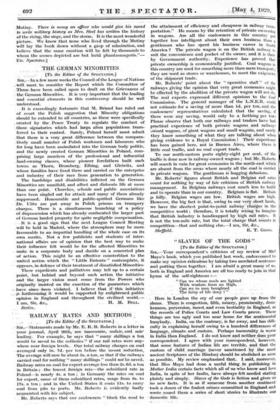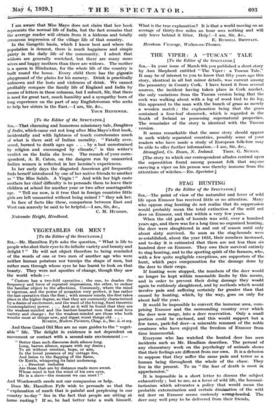" SLAVES OF THE GODS " [To the Editor of
the SPECTATOR.] Srrt,—Your correspondent's criticism of my review of Miss Mayo's book, which you published last week, .endeayoured to make my opinion ridiculous by taking two unrelated sentences and putting them together. I am afraid a great many of us, both in England and America are all too ready -to join in that hymn Of the self-righteous :— " Can we whose souls are lighted With wisdoin from on High, Can we, to n;Len benighted The lainp of life deny ? " , - Here in-London the cry of our people goes up from the slums. - There is congestion, filth, misery, .promiscuity, drun- kenness,, perversion, incest. and even bestiality in England, as the records of Police Courts and Law Courts prove. These things are too ugly and too • near home for the sentimental busybody. India, on the contrary, is far away, and has diffi- culty in explaining herself owing to a hundred differences of language,, and custom. Perhaps immorality is worse in India than England. I do not knoW, and neither does your correspondent. I agree with your Correspondent, however, that some features of Indian life are terrible, and that the custom of child marriage (never sanctioned by ,the most ancient Scriptures of the Hindus) should be abolished as soon
as possible. My review emphasized that. I said, moreover,
that Miss Mayo had done a useful thing in publishing in Mother India certain facts which all of us-who know and love India, in spite of her faults, have always felt needed stating plainly and simply. Slaves of the Gods is fiction and gives us no new facts. It -is as if someone from -another continent took- a dozen of the foulest crimes committed in England and wrote, round them a series of short 'stories to illustrate our domestic life.- I aware that Miss Mayo does not claim that her book represents the normal life of India, but the fact remains that the average reader will obtain from it a hideous and totally erroneous impression, of the village life of that country.
In the Gangetic basin, which I know best and where the population is densest, there is much happiness and simple gaiety in the daily life • of the community. I admit that widows are generally wretched, but there are many more wives and happy mothers than there are widows. The mother is a queen in Hindustan, for the whole life of the country is built round the home. Every child there has the gigruAtie playground of the plains for his nursery. Drink is practically unknown and the lusts and violenees of drink. We cannot profitably compare the family life of England and India by means of -letters in these columns, but I submit, Sir, that there is need for great tact, much humility and a sympathy born of long experience on the part of any Englishwoman who seeks to help her sisters in the East.—I am, Sir, &c.,
YOUR REVIEWER.























































 Previous page
Previous page